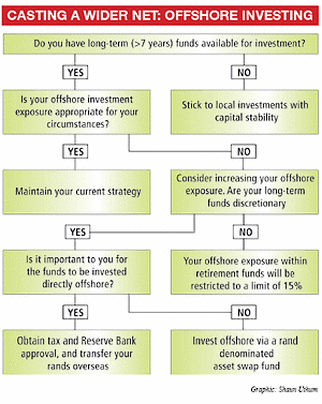Investing Off Shore: Everything You Need to Know About Legal Compliance
Wiki Article
Understanding the Value of Investing Off Coast for Wide Range Diversification
Offshore investing plays a substantial function in wealth diversification. It allows individuals to take advantage of a broader variety of global markets and investment opportunities - Investing Off Shore. This technique can successfully alleviate risks linked to domestic financial uncertainties. On top of that, overseas investments may supply regulatory and tax obligation benefits. However, several continue to be uninformed of the complexities and subtleties included. Recognizing these components is vital for anybody considering this method for their economic future. What elements should one think about before taking the dive?The Concept of Offshore Spending
Offshore investing describes the practice of placing properties in monetary markets outside one's home nation, usually to achieve greater monetary safety and diversification. This strategy permits corporations and people to access different international markets, possibly taking advantage of different financial environments, currency worths, and investment opportunities. Investors may pick offshore accounts for factors such as governing advantages, tax obligation benefits, or personal privacy protection.The concept encompasses a series of investment lorries, including stocks, bonds, actual estate, and mutual funds, offered with international financial organizations. In addition, offshore investing can assist mitigate risks connected with domestic market changes. By spreading financial investments worldwide, individuals can potentially secure their wide range versus economic or political instability within their home country. In general, offshore investing acts as a tactical strategy to boost monetary profiles, providing access to a more comprehensive range of properties and opportunities past regional markets.Benefits of Expanding Your Financial Investment Profile

Threat Reduction Strategies
Exactly how can financiers effectively manage risk while making best use of returns? One key strategy is property allowance, which involves dispersing investments throughout various asset classes to minimize direct exposure to any kind of single risk. Financiers can expand geographically by consisting of overseas properties, which usually act in a different way than domestic investments, consequently minimizing total profile volatility. In addition, including different investments, such as real estate or commodities, can supply additional threat mitigation. Routinely rebalancing the profile guarantees that property allocations remain aligned with danger tolerance and financial investment objectives. Additionally, comprehending market fads and financial indications can aid capitalists anticipate changes and adjust their portfolios as necessary. Ultimately, a well-structured investment method emphasizes diversity, aiming to balance potential returns with acceptable degrees of danger.Currency Diversity Benefits
Investors who integrate money diversification into their portfolios can boost their capacity for returns while decreasing direct exposure to regional economic fluctuations. By holding properties in several money, they can capitalize on desirable currency exchange rate activities and alleviate losses from money devaluation in their home market. This technique not only spreads out risk but additionally opens opportunities for investment in arising markets, which may provide greater growth capacity. In addition, money diversity can serve as a bush versus rising cost of living and political instability, offering a buffer throughout economic slumps. Generally, this approach promotes a much more durable investment portfolio, allowing capitalists to navigate worldwide markets with higher adaptability and confidence, inevitably resulting in improved long-term economic security.
Lowering Danger Through Geographical Diversity
Geographical diversity uses substantial benefits by spreading out investments throughout various areas and markets. This approach helps decrease threats associated with financial instability, as slumps in one area may be offset by growth in one more. Furthermore, buying arising markets can offer special opportunities for higher returns and further boost profile strength.Advantages of Geographic Diversity
Why should one consider geographic diversification as an approach for threat decrease? Geographic diversity enables investors to spread their assets across numerous countries and regions, alleviating the effect of local financial recessions. By investing in multiple markets, one can take advantage of various growth cycles, money activities, and market characteristics. This technique lowers dependence on a solitary economic climate, which can be at risk to political instability or natural disasters. Furthermore, geographic diversification can boost profile efficiency by taking advantage of emerging markets with high development capacity. It supplies a barrier against rising cost of living rates that may differ by region, making sure that the general worth of investments continues to be secure. Eventually, geographic diversification is a prudent strategy for securing riches versus unpredictable international events.Lessening Financial Instability Risks

Economic instability can present considerable threats to investment profiles, making it vital to adopt strategies that mitigate these dangers. One reliable technique is geographical diversity, which entails spreading financial investments throughout numerous areas and countries. By alloting properties in different economic atmospheres, financiers can minimize their exposure to local financial recessions. If one nation deals with an economic downturn, investments in various other areas might continue to be secure or even prosper, providing a buffer versus possible losses. Additionally, buying numerous money can further shield versus money changes and inflation risks. In general, minimizing economic instability risks with geographical diversity not just improves strength however additionally positions financiers to seize possibilities in different markets, ultimately promoting long-term financial safety and security.
Spending in Emerging Markets
Purchasing emerging markets provides a check out here strategic avenue for minimizing threat through geographical diversification. These markets, frequently defined by quick development and advancing financial landscapes, can offer one-of-a-kind opportunities that are much less associated with industrialized markets. By allocating resources to countries with burgeoning markets and increasing customer bases, financiers can reduce the influence of localized economic slumps. In addition, emerging markets might exhibit greater development possibility, enabling investors to utilize on desirable group trends and enhancing worldwide need. It is essential to acknowledge the fundamental risks, including political instability and money changes. A well balanced and well-researched strategy permits capitalists to harness the benefits of arising markets while efficiently handling prospective drawbacks, ultimately improving their general profile durabilityAccessing Arising Markets and Opportunities
As international markets advance, accessing arising markets provides a compelling avenue for wealth diversity. These markets usually reveal quick growth possibility, driven by enhancing customer demand and technical developments. Capitalists can touch into industries such as technology, renewable resource, and infrastructure, which are critical in driving economic growth in these regions.Strategically investing in arising markets allows investors to profit from desirable demographics and rising middle-class populaces. This produces one-of-a-kind opportunities for organizations to flourish and, as a result, for capitalists to take advantage of significant returns. Furthermore, emerging markets frequently display reduced correlations with developed markets, using a barrier against volatility.To properly access these opportunities, financiers can utilize different automobiles, including exchange-traded funds (ETFs), shared funds, and straight equity financial investments. By diversifying their portfolios through arising markets, capitalists can enhance their total risk-adjusted returns while placing themselves advantageously in a regularly changing global landscape.Currency Protection and Hedging Approaches

Legal Considerations and Compliance in Offshore Spending
Guiding via the intricacies of overseas investing calls for a keen awareness of the legal landscape and conformity needs that vary by jurisdiction. Investors must thoroughly understand guidelines worrying international financial investments, taxes, and reporting commitments to guarantee conformity with both neighborhood and global legislations. Several nations have particular legislations controling the establishment of offshore accounts and entities, which can include stringent Know Your Client (KYC) and Anti-Money Laundering (AML) regulations.Furthermore, financiers must beware regarding possible legal risks, consisting of tax obligation evasion or unintended infractions of securities regulations. Engaging with credible economic experts or legal specialists acquainted with overseas regulations is important to navigate these complexities. In addition, staying educated about modifications in policies and regulations is crucial, as non-compliance can bring about severe charges. Ultimately, an extensive understanding of legal factors to consider warranties that offshore financial investments add favorably to wide range diversity without sustaining legal effects.Actions to Start With Offshore Investments
Numerous investors looking for to expand their riches may find the procedure of starting offshore investments both gratifying and tough. The initial step includes detailed research study to recognize appropriate offshore jurisdictions that align with investment objectives and use beneficial policies. Following this, investors should select a reputable banks or investment company experienced in offshore financial investments. Opening up an offshore account is vital, demanding the entry of individual identification and compliance documents.Next, financiers ought to analyze different investment choices, such as realty, mutual funds, or supplies, ensuring they line up with danger resistance and financial objectives. Consulting with legal professionals or monetary advisors can provide valuable insights into the complexities of overseas financial investments. Routine tracking and re-evaluation of the investment profile are essential to adjust to market adjustments and guarantee peak efficiency. By following these actions, capitalists can effectively browse the offshore investment landscape.Frequently Asked Concerns
What Types of Possessions Can I Invest in Offshore?
The present concern checks out numerous overseas investment choices. People can think about properties such as realty, common funds, stocks, bonds, rare-earth elements, and cryptocurrencies, each offering unique benefits relying on individual economic goals and run the risk of tolerance.Exist Minimum Financial Investment Amounts for Offshore Accounts?
Minimum financial investment quantities for overseas accounts vary significantly relying on the institution and kind of account. check this Some require as low as a couple of thousand bucks, while others may stipulate greater limits for costs services and investment possibilities.Just How Do Tax Obligations Work on Offshore Investments?
Taxes on offshore financial investments differ by territory and the capitalist's home nation. Normally, revenue generated may website here undergo tax locally, while some countries may supply tax incentives or exemptions for certain overseas accounts.Can I Handle Offshore Investments From Another Location?
Taking care of offshore financial investments from another location is without a doubt possible. Lots of economic organizations provide on the internet platforms, allowing financiers to keep an eye on and transact perfectly from anywhere, supplied they adhere to governing requirements and comprehend the affiliated threats and fees.What Are Common Mistaken Beliefs Regarding Offshore Investing?
Common misunderstandings regarding offshore investing consist of the idea that it is solely for the wealthy, naturally unlawful, or excessively complicated. In truth, it can be easily accessible, lawful, and workable for different capitalists seeking diversification. By spreading out investments throughout various property classes and geographical areas, capitalists can safeguard themselves versus market volatility and money variations. Geographic diversification supplies considerable benefits by spreading out investments throughout different areas and markets. Additionally, arising markets often show reduced correlations with developed markets, supplying a buffer against volatility.To effectively accessibility these opportunities, investors can use various vehicles, including exchange-traded funds (ETFs), mutual funds, and direct equity investments. Following this, investors must pick a reputable financial establishment or investment firm experienced in offshore investments. Normal tracking and re-evaluation of the investment profile are necessary to adjust to market modifications and ensure peak efficiency.Report this wiki page